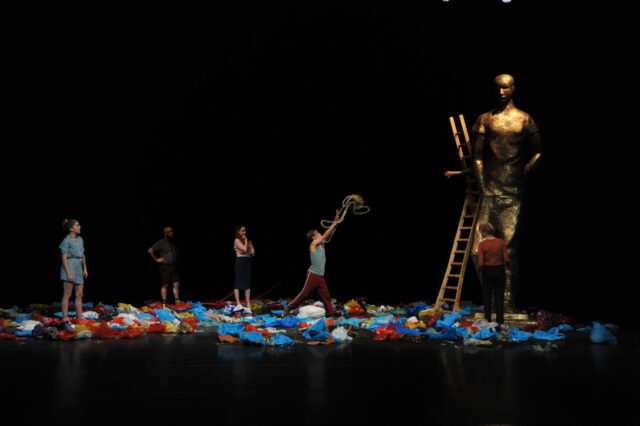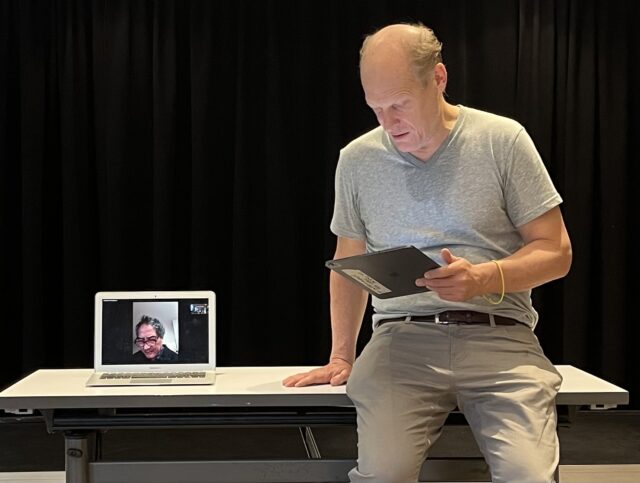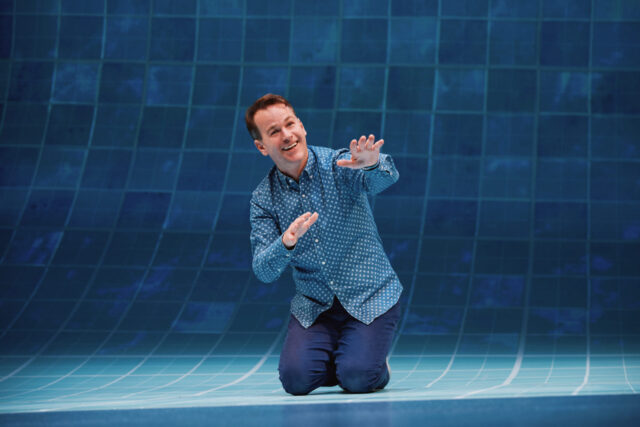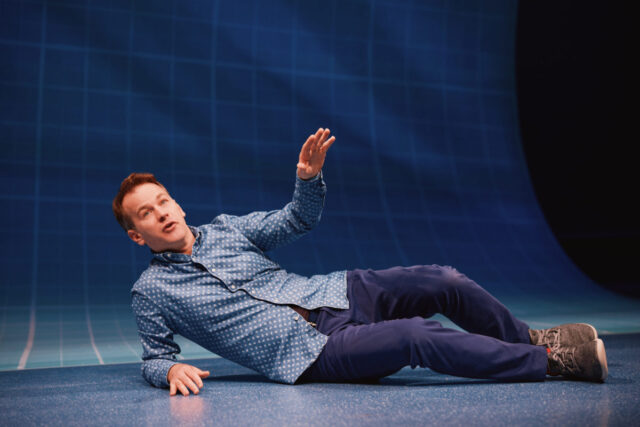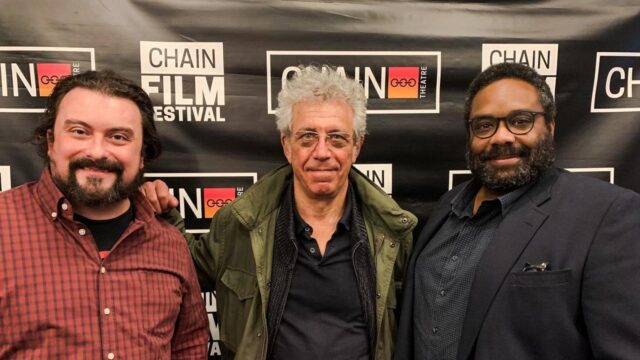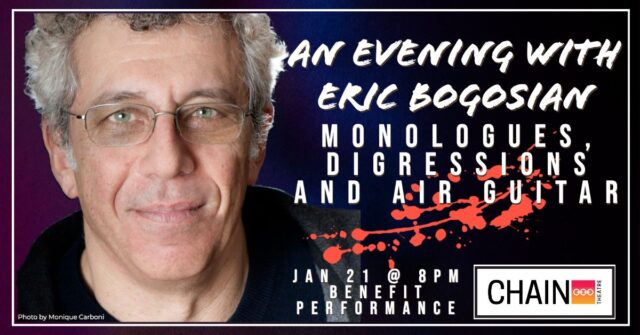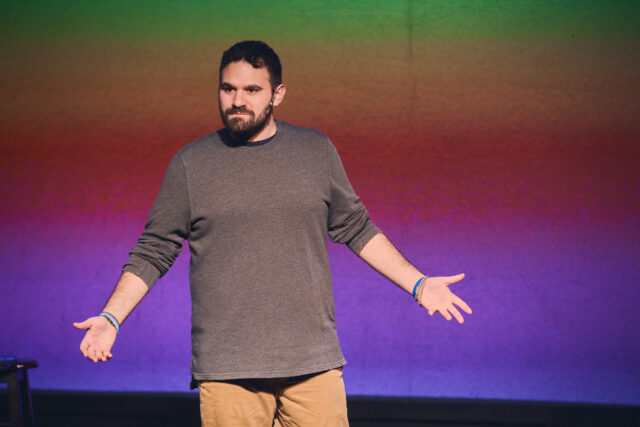
Gabe Mollica shares his difficulty in making friends in one-man show (photo by Mindy Tucker)
GABE MOLLICA: SOLO: A SHOW ABOUT FRIENDSHIP
Soho Playhouse
15 Vandam St. between Varick St. & Sixth Ave.
Wednesday – Saturday through February 25, $36, 9:00
Extension: Connelly Theater Upstairs
220 East Fourth St. between Aves. A & B
Tuesday – Saturday through November 18, $40
www.sohoplayhouse.com
www.gabemollica.com
Having earned multiple extensions since opening at Soho Playhouse on November 2, comedian Gabe Mollica and his one-man Solo: A Show About Friendship are hard not to love. Yet the night I went, there were fewer than twenty people in the audience, several of whom Mollica knew, referring to them by name as they nodded in agreement with something he said onstage. In his easygoing, not-quite-self-deprecating demeanor, Mollica started the sixty-minute confessional pointing out that he has performed Solo for three people at the Edinburgh Fringe Festival — “the same three people that an hour earlier I had had dinner with” — and for a packed Soho Playhouse on a Saturday night, so he was not bothered by such a sparse turnout on a cold Thursday. In fact, it fit the theme of the evening, which he explains early on: “This is a show about how I don’t have friends.”
Mollica, who recently turned thirty, hails from Garden City, and lives in Astoria, spends an hour detailing his lifetime of seeking male companionship that goes beyond mere camaraderie. He provides a spot-on description of his “six bros,” complete with their going-out and staying-home rituals. One of the bros, Nick, makes ranked lists, from types of music and wood to Adam Sandler flicks. (Yo, Nick, how is Uncut Gems not in the top ten?). Mollica also reveals that his mother, who is named Joy, is sick. (“She’s feeling a lot better now. Thank you for asking.”)
Obsessed in high school with Stephen Sondheim and terrible at sports, Mollica found himself trapped in the middle, “too straight for the gay kids but too gay for the straight kids.” At college he meets Tom, and they hit it off right away, becoming inseparable. Mollica is thrilled beyond belief that he finally has someone he can say anything to, can receive unconditional support from, and is able to be completely honest with.
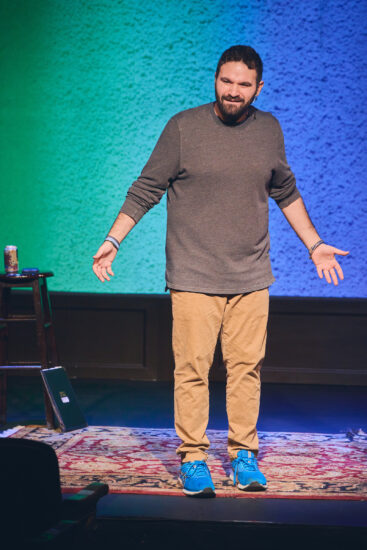
Gabe Mollica admits to being “too straight for the gay kids but too gay for the straight kids” in Solo (photo by Mindy Tucker)
Mollica relates his and Tom’s adventures and misadventures, but because he’s already told us that today he has no friends, there’s some well-executed narrative tension as we await the inevitable funny/not-funny punchline. Before he gets to that, Mollica discusses his origins as a stand-up comic, his relationships with a few women, and his job working at a summer camp, occasionally supplemented with photos projected on a screen at the back of the stage, which otherwise features only a small stool and a carpet.
Smoothly directed by comedian and monologist Greg Walloch (Hasan Minhaj: Homecoming King, F**k the Disabled), Solo is an engaging and heartfelt look at male bonding and the need to have friends, regardless of gender. The show is smartly written, with a finale that circles back to the beginning and results in a poignant conclusion that makes you want to immediately get in touch with your best friend(s). Mollica has a natural charm that, well, will compel you to want to be his friend. After the show, he greeted audience members outside the theater, shaking hands, hugging, and posing for photos. We invited him to an upcoming tribute to Stephen Sondheim; we don’t know whether he’ll be coming solo.
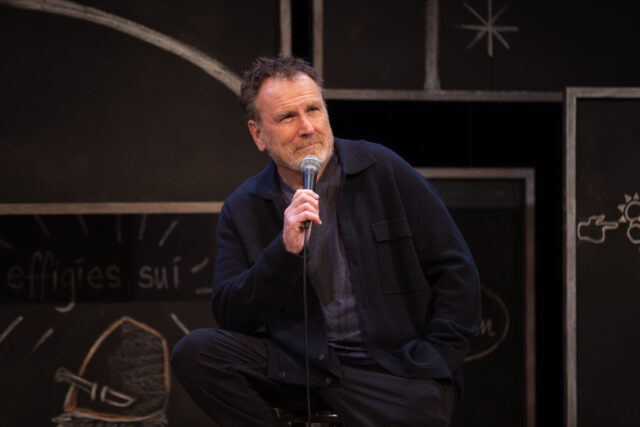
Colin Quinn offers more than just small talk in Small Talk (photo by Monique Carboni)
COLIN QUINN: SMALL TALK
Lucille Lortel Theatre
121 Christopher St.
Monday – Saturday through February 11, $49-$59
Greenwich House
27 Barrow St. at Seventh Ave. South
Tuesday, Saturday, Sunday, March 30 – May 6, $49-$79
www.colinquinnshow.com
There’s a fine line between thematic stand-up comedy and a one-person theatrical show. Recent presentations such as Mike Birbiglia’s The Old Man & the Pool, Alex Edelman’s Just for Us, and Ryan J. Haddad’s Hi, Are You Single? qualify as the latter, as does Gabe Mollica’s aptly titled Solo.
Brooklyn-born actor and comedian Colin Quinn is a master of the one-man show, having explored the history of New York, America, and the world in such highly praised works as Long Story Short, Unconstitutional, The New York Story, and Red State Blue State.
His latest solo foray is Colin Quinn: Small Talk, continuing at the Lucille Lortel Theatre through February 11 (and now extended March 30 to May 6 at Greenwich House). The seventy-five-minute show explores how strangers connect, or don’t, by taking part in brief, generally inconsequential face-to-face conversations in elevators, at stores, at work, or on the street, chatting about the weather, sports, what day of the week it is, and other minor tidbits. “Small talk is intimate. It’s an acknowledgment,” he explains. “It’s like two ships that signal each other in the ocean. . . . It’s how we unite by common experience in under a paragraph.”
He worries that the way kids today are being raised, the end of small talk, which began with cavemen and reached new levels with Socrates, is fast approaching, since it depends on one of humankind’s most important inventions, “citizen personality,” which we no longer teach or value. “Personality is who the people that know you think you are. Your reputation is who the people who don’t know you think you are. Your social media profile is who you think you are, and your browser history is who you are,” he says.
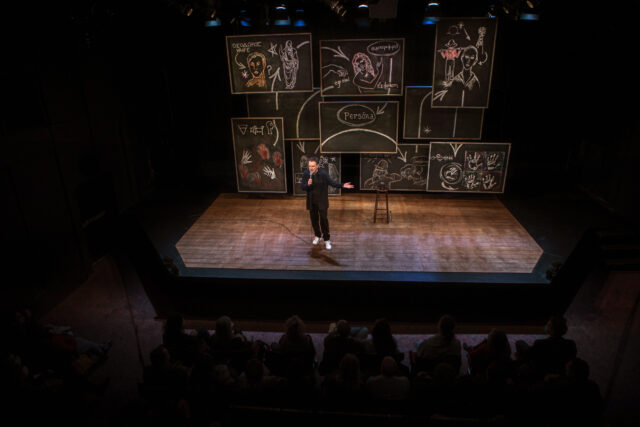
Colin Quinn discusses banter, personality, and the history of small talk in latest solo performance (photo by Monique Carboni)
Walking around the stage in a black tee, unbuttoned black shirt, black pants, and white sneakers, Quinn, in his familiar gravelly voice, fills the show with pop-culture references, controversial political issues, and the top five “last words.” Individual jokes can be incisive, immediately relatable, and very funny, but the show, directed by James Fauvell, feels at times like it’s still a work-in-progress. Several tangents and digressions don’t seem to arise naturally from the narrative.
Quinn, who had a heart attack on Valentine’s Day in 2018 when he was fifty-eight, scans the audience for reactions as if he’s testing out new material. After seeing him look up numerous times at a spot in the back of the theater, I turned around and noticed a monitor where the text was scrolling by. He also uses a handheld microphone, which is more associated with stand-up than theatrical productions. Zoë Hurvitz’s set consists of ten blackboards with chalk drawings on them, linking images of hands and faces with Ancient Greek words and modern emojis, but they are never incorporated into the show or identified, which left me scratching my head.
From his days on MTV’s Remote Control and Comedy Central’s Tough Crowd with Colin Quinn through his solo presentations and film and television appearances (Girls, Trainwreck), Quinn has demonstrated his unique personality along with his hilarious and all-too-real take on society at large. “Some people don’t like small talk,” Quinn says in the show. I liked Small Talk, but I wanted to love it. Quinn’s response might be, as he says about one friend’s thoughts on sausage and peppers, “Nobody gives a shit and nobody asked you.” To which I might respond, “Hey, how ’bout this weather?”

